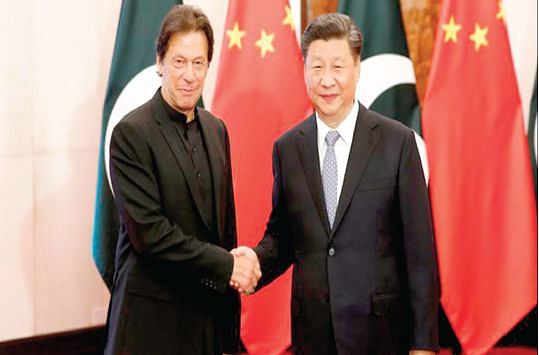Pakistan Prime Minister Imran Khan concluded his four-day visit of China on Sunday, and all that was articulated, was on the expected lines. All the talking points that Imran Khan carried with him were known even before he landed in Beijing to show solidarity with China on winter Olympics which ran into a series of controversies.
Pakistan was obliged to stand in solidarity with China, for two reasons; to reaffirm its all-weather friendship with it and also because the West, led by the US had boycotted games officially to register its protest against the human rights abuses Beijing has inflicted on the Muslims of Xinjiang province.
India was a late comer to the diplomatic boycott club, and it had its own reasons. Delhi was biffed by the arrogance and audacity of Beijing to snub India at the games by choosing PLA’s regimental commander Qi Fabio, involved in the Galwan Valley clashes in June 2020, in which 20 Indian soldiers had died, as one of the torch bearers for the games.
This was a deliberate affront to India, as it sought to tell the world that China had ruled supreme at the Himalayan heights where these stone-age clashes took place on June 15/16, 2020.
This, by any reading, was not only the politicisation of the games, but also delivered a military message to India, locked in a tense standoff in eastern Ladakh that China can go to any length to showcase its military prowess. It can politicise the global level games as well.
The Galwan Valley clashes were as much a matter of territorial and national sovereignty as these represented the contest of the national prestige. To display the symbol of violent clashes at the games was breach of the spirit that the games represent.
But then China is China. The least one could have expected from Imran Khan, a legendary cricketer of the subcontinent, to have told his host that this is not done.
The Chinese act was a severe violation of the bonhomie that the games want to generate, but he kept mum over the issue, because he views India as a foe.
Instead Imran Khan, as was expected, during his meeting with the Chinese President Xi Jingping, blamed India for militarisation and creating instability in the region.
He was duty bound to say so, because his country owes its economic, political and economic existence to China. Without the patronage of China, Pakistan would be a nation in wilderness.
But if it is a friend of China, it should have counselled his host that India should be made a partner in stablising the situation in the region, but he neither acted like a sportsman nor as a statesman. He showed himself more as India-basher than anything else.
India should have watched each and every move of Pakistani leader, his delegation and their activities in China, as the country is faced with military standoff position with both of its neighbours. The current situation vis-à-vis China and vis-a-vis Pakistan is quite serious.
Shutting eyes to the situation and its anticipated consequences is not a solution. The grim reality, as noted and articulated by the Indian army chief Gen. M M Naravane is that this is over stretching the military resources.
It is a tough situation that India is facing on its borders with China and Pakistan, and therefore, to suggest that India is going in for militarisation in the region is preposterous, to say the least.
India has the right to defend its borders, guard its national sovereignty and also to maintain internal peace in the wake of more than three-decade-long proxy wars.
Though it was not expected, but it would have been better for Imran Khan and the Chinese President to discuss how to defuse the tensions and work for peace and stability in the region. Pakistan had an added responsibility to seek such a behaviour from China, which it claims, is its all-weather friend and benefactor.
This must have been the best course for Pakistan, as its experiment in Afghanistan has already backfired. The lesson that Taliban ruled Afghanistan has delivered to Pakistan is that it is dangerous to meddle in the internal affairs of its neighbouring country.
Imran Khan who had been pitching for the exit of the American forces from Afghan soil and made all out efforts – military, political and diplomatic – to seek legitimacy for Taliban, is in soup.
Because Taliban has neither stopped the terror groups from mounting attacks on Pakistani security forces, and the new Afghan rulers have become skeptical of Pakistan and its motives on border. This happened , despite China bestowing all its blessings on Pakistan in its adventurism in Afghanistan.
Pakistan, having sway over Taliban, is in a helpless situation. It cannot afford to annoy Afghanistan’s Taliban rulers and at the same time it has come to know of its limits in speaking for Taliban at the international level. In short, Imran Khan’s enterprise in Afghanistan, with the help of China, has been defeated.
Imran Khan spoke of “atrocities” in Kashmir. That all sounded hollow. First, its own track record of subjugating the people of Pakistan occupied Jammu and Kashmir is so dismal that there are voices, quite loud ones, seeking liberation from Pakistan.
And what is happening in Balochistan where people disappear mysteriously never to return, fundamental rights have been trampled by jackboots and the resources of the province have been appropriated by Pakistan and shared with China.
This, for all the reality that it presents, is a recipe for further destabilisation of the region. It is a China-Pakistan doing.
Disclaimer: The views and opinions expressed in this article are the personal opinions of the author.
The facts, analysis, assumptions and perspective appearing in the article do not reflect the views of GK.







